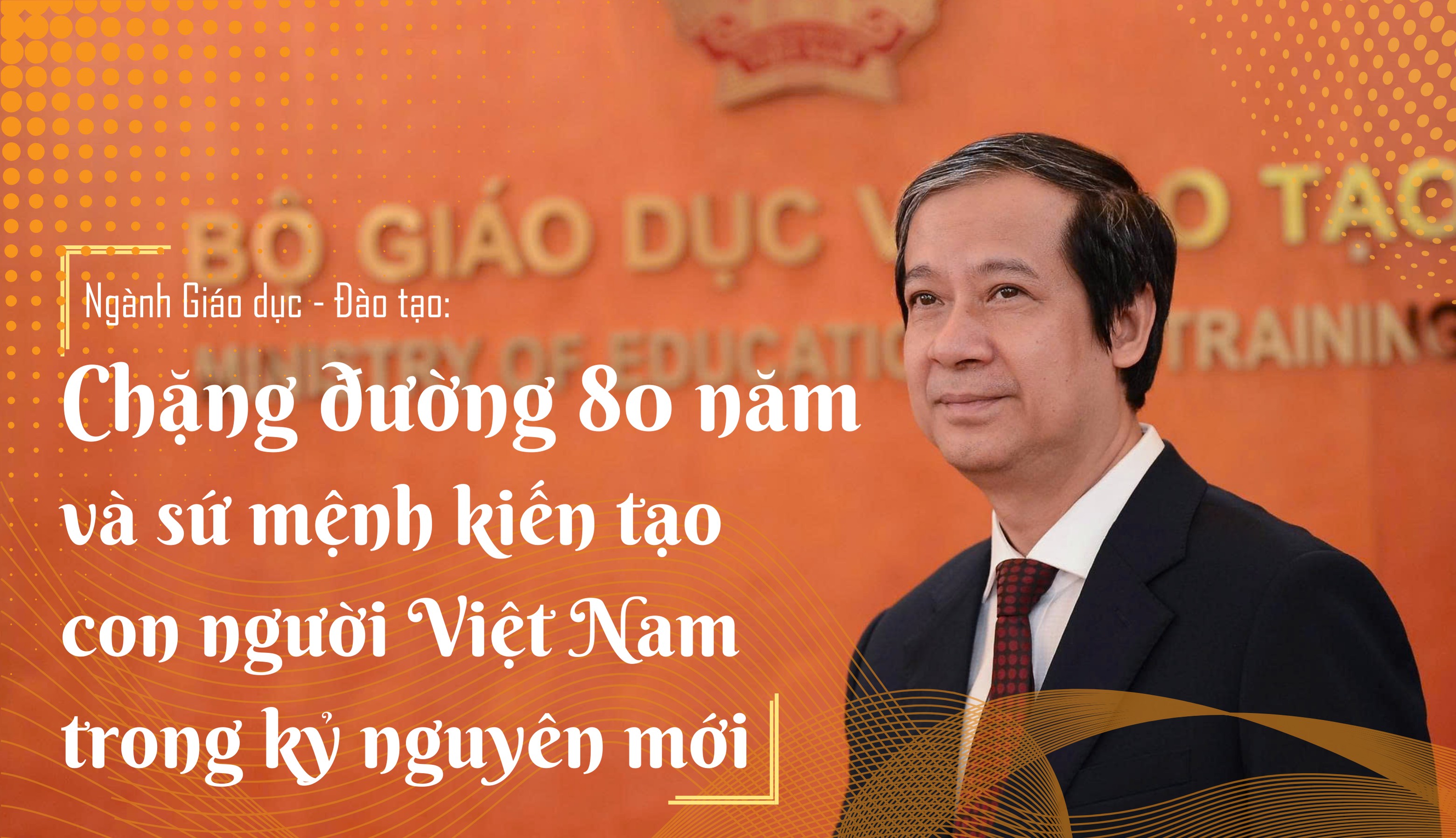
GD&TĐ - The opening ceremony of the 2025-2026 school year takes place in a special context: Celebrating the 80th anniversary of the National Day of the Socialist Republic of Vietnam; carrying out the rearrangement of administrative units; organizing Party Congresses at all levels; celebrating the 80th anniversary of the tradition of the Education sector...
On this occasion, Minister of Education and Training Nguyen Kim Son shared in-depth about achievements, valuable lessons and strategic directions for the education sector to continue reaching new heights.

Looking back over the past 80 years, according to the Minister, what are the most outstanding marks of the Education and Training sector?
Minister Nguyen Kim Son : Immediately after the success of the August Revolution, the Ministry of National Education was established, with the mission of building a completely new education system, of the people, by the people and for the people. Under the leadership of the Party and President Ho Chi Minh, the new education system was established with three core principles: "nationalization, scientificization , popularization".
During the period 1945-1954, the Popular Education and Cultural Supplementary Education movements eliminated illiteracy for millions of people, raising the people's knowledge. Despite the war, the school system was continuously expanded to train a generation of "Resistance Citizens", the core human resource for the cause of "resistance and nation building".
During the period 1954-1975, although the country was divided and engulfed in the flames of war, education still achieved remarkable results. The 1956 education reform built a complete national education system. The North basically eliminated illiteracy. Tens of thousands of cadres, intellectuals, engineers, doctors, and teachers were trained domestically and sent to socialist countries for training; Southern students were raised and trained in the North and became the core human resources serving the cause of unification and national construction in the future.
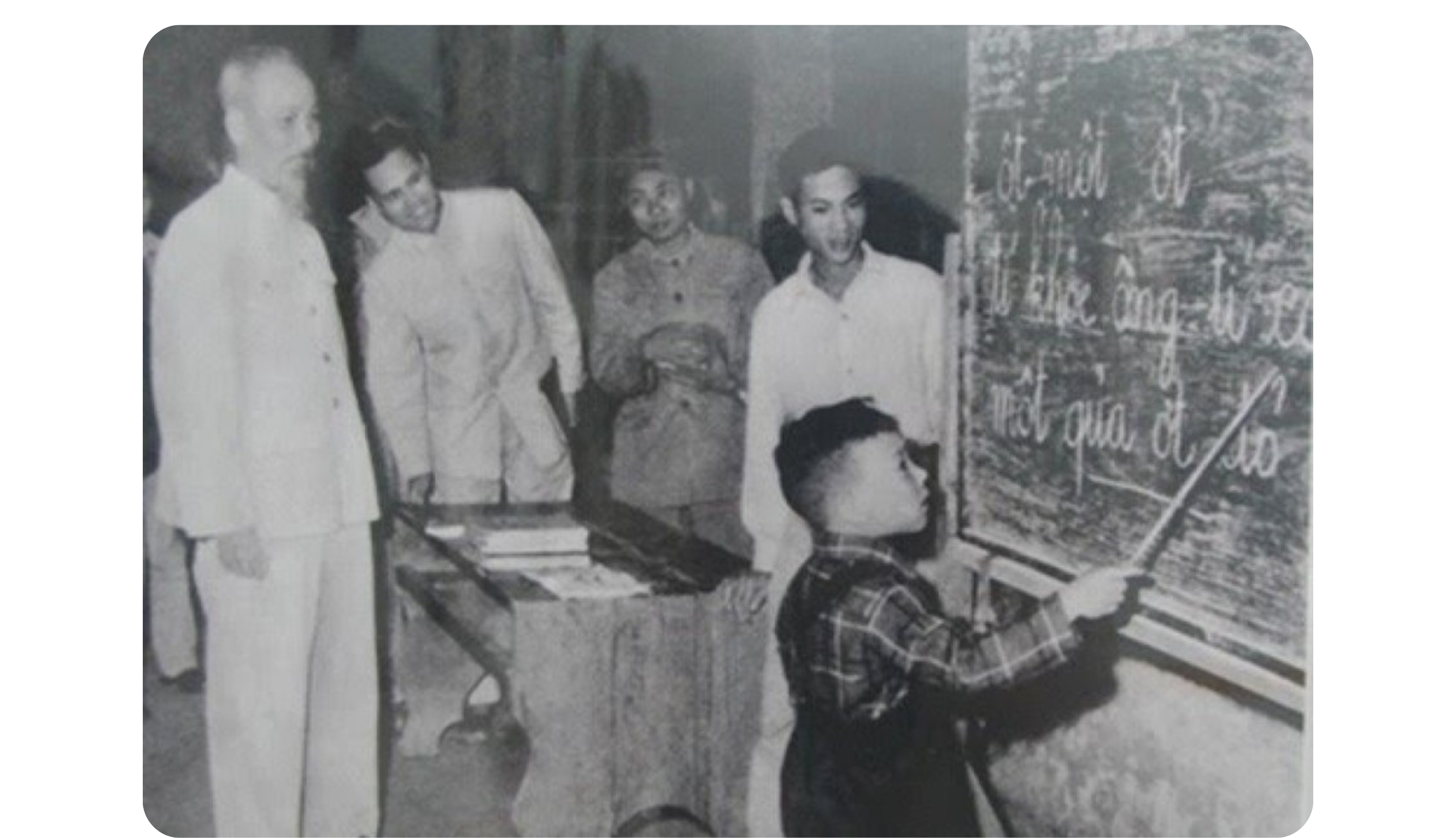
During the period 1975-1986, the country faced many difficulties due to the consequences of war, siege, embargo and the consequences of centralized bureaucratic management and subsidies, but education still achieved many important achievements. The most prominent of which was the successful unification of the national education system; the network of schools was maintained and expanded to all regions; success in eliminating illiteracy and improving people's knowledge; and at the same time, building a comprehensive system of educational guidelines and policies - the guiding principle for the sector's activities in the following years.
From 1986 to present, the country has entered the process of innovation and integration, education has been identified as "education is the top national policy". Resolution No. 29-NQ/TW dated November 4, 2013 was issued, becoming a particularly important foundation for fundamental and comprehensive innovation in education and training.
Along with that, the legal system and policies are constantly being improved, creating a solid legal basis for educational innovation. The two innovations of the general education program (2006 and 2018), especially the 2018 General Education Program, marked a major turning point in the viewpoints, goals, content, and methods of education when shifting from teaching with a heavy emphasis on imparting knowledge to developing learners' capacity and qualities. All of this has created a completely new look for education, both in scale and quality.
From the journey of 8 decades, what lessons has the Minister drawn that are still valuable for educational development today?
Minister Nguyen Kim Son: The first lesson is to firmly position people at the center, consider student happiness and social progress as important measures, not chasing after scale or achievements, but aiming at real quality and comprehensive development.
The second lesson is that institutions must be one step ahead. Only when laws and policies are clear, consistent, feasible, transparent, accompanied by effective accountability and monitoring mechanisms, can innovation have a sustainable foothold and minimize implementation risks.
The third lesson is that education must truly be the cause of the entire people, and must be closely linked to real life. All major policies and decisions related to education need to be measured and evaluated objectively; teachers, students, parents and experts must be listened to; consensus must be created and the "joint efforts and contributions" of the entire community must be mobilized.
The fourth lesson is that teachers play a decisive role in implementing educational policies. Without a team with adequate qualifications, capacity and professional conditions, all programs, textbooks, equipment or technology… cannot be fully effective.
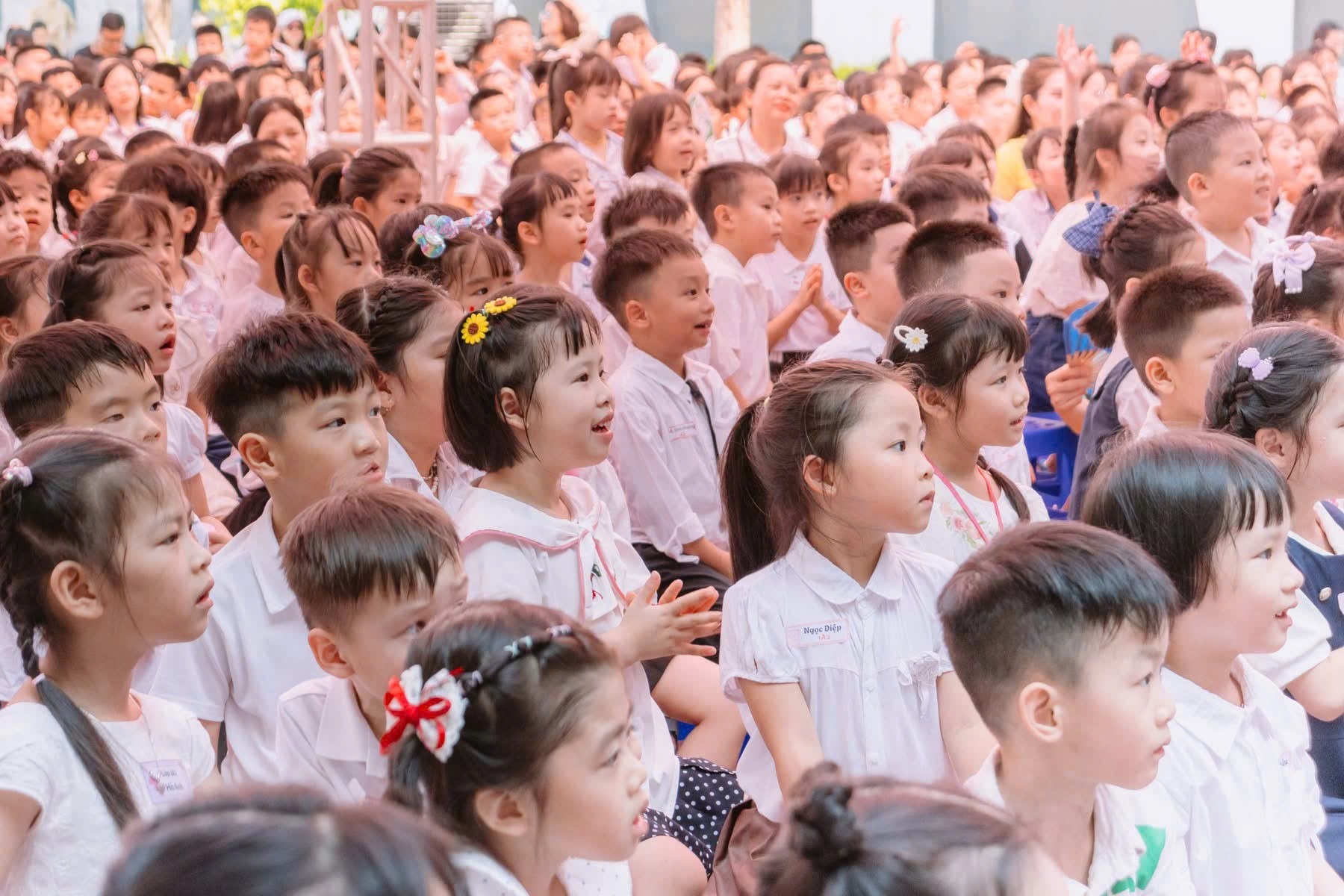
If you were to send a message on the occasion of the 80th anniversary of the Ministry's founding, what would you like to emphasize?
Minister Nguyen Kim Son: Education and training is the cause of the Party, the State and the entire people. With the Party's wise and consistent leadership; the unified, effective and efficient management of the State; the companionship of all classes of people and the business community; and the sense of responsibility, dedication and desire for innovation of the teaching staff, we have every reason to believe in new, steady steps forward.
Continuing to adhere to the goal of improving people's knowledge, training human resources, nurturing talents; promoting innovation and digital transformation; developing inclusive, equitable and quality education; closely linking education with science and technology and the labor market; we will successfully build an advanced, modern, humane Vietnamese education system imbued with national identity, which is a solid foundation to realize the aspiration to develop a prosperous and happy country in the 21st century, towards the 100th anniversary of the country's founding (1945-2045).

The opening ceremony of the 2025-2026 school year takes place in a very special context. What is the significance of this event to the Minister?
Minister Nguyen Kim Son : The opening ceremony of the 2025-2026 school year takes place in a special context: the whole country celebrates the 80th anniversary of National Day; carries out the historical "rearrangement of the country"; organizes Party Congresses at all levels...
For the education sector, the beginning of the new school year is also an occasion to celebrate the 80th anniversary of the education sector's tradition, as well as the 80th anniversary of the establishment of the Ministry of National Education. This is not only an opportunity for us to look back on the 80-year journey of education to develop the country, but also an opportunity to be more aware of the mission and responsibility of education in creating people, building and developing the country, and striving to integrate in the new era.
The significance of the opening ceremony was further deepened when 52,000 educational institutions across the country connected online and broadcast live, with the presence of the highest leaders of the Party and State, to spread the belief, spirit, and determination to bring Vietnamese education to new heights.
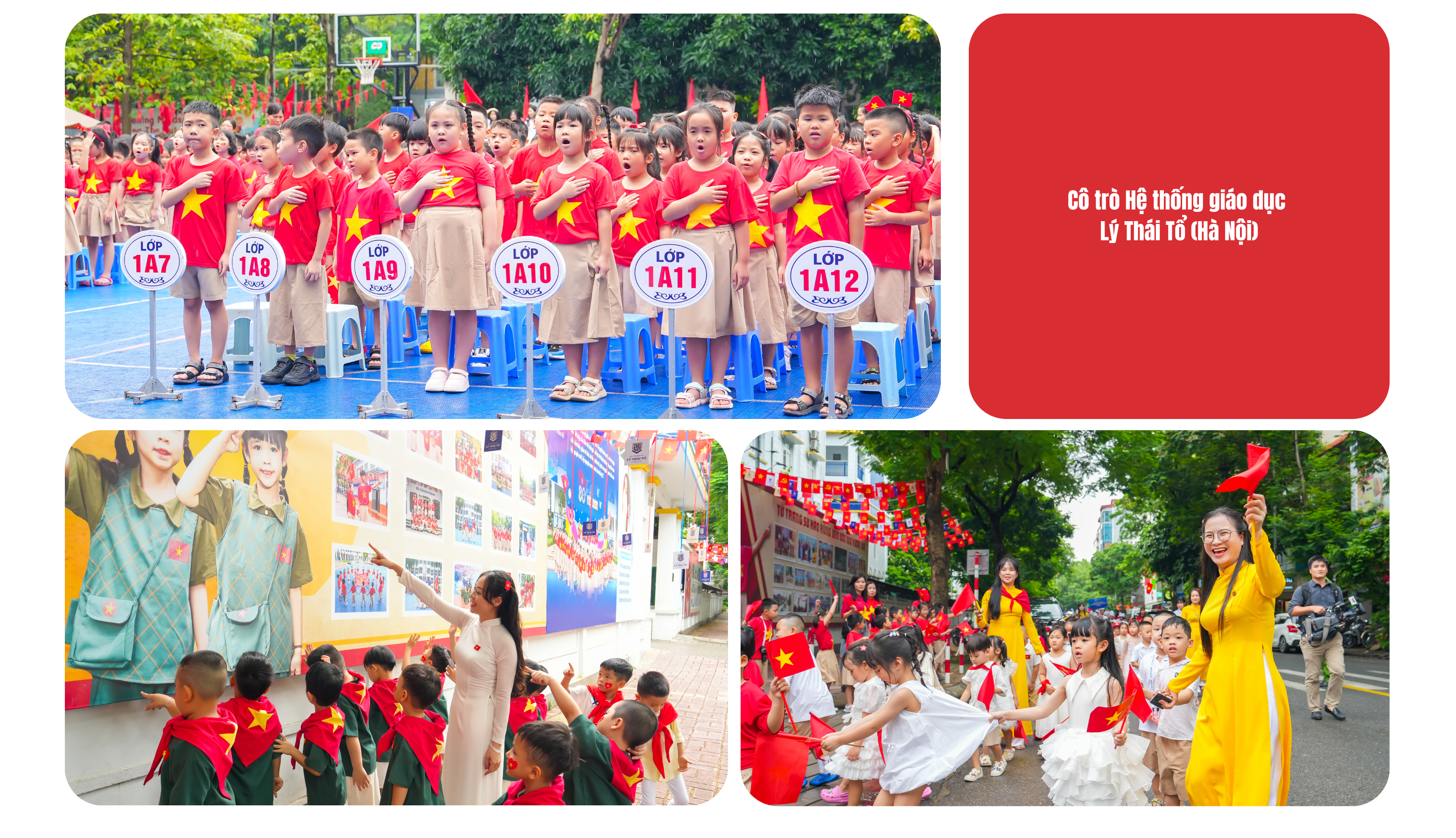
Entering the new school year, what are the most notable opportunities and challenges facing the education sector, Minister?
Minister Nguyen Kim Son: This school year, the education sector is facing unprecedented opportunities. Never before has education and training received as much attention and expectation from the Party and the State as it does today. The most important of these is the recent issuance by the Politburo of Resolution No. 71-NQ/TW on breakthroughs in education and training development. This is an important political foundation to further promote the fundamental and comprehensive innovation of education and training that was established in Resolution No. 29-NQ/TW (2013) and continued to be emphasized in Conclusion No. 91-KL/TW (2024).
Along with that, a national target program on education and training development is being built; four important laws on education (Law on Teachers; Law on amending and supplementing a number of articles of the Law on Education, Law on amended Higher Education and Law on amended Vocational Education) have been and are expected to be issued this year, creating a solid foundation for operating a modern, synchronous and effective education system. Digital transformation, application of artificial intelligence and STEM education are also opening up opportunities for education to enter a stage of quality improvement and comprehensive innovation.
Besides opportunities, the education sector also faces many challenges. The operation of the two-tier local government model, especially at the commune level, places high demands on managing changes in organization, personnel and apparatus. The issues of educational equity; extra teaching and learning; teacher recruitment and rotation; and universalization are also challenges that the sector must resolutely address. In addition, absorbing huge investment resources in the coming time, ensuring efficiency and compliance with regulations also requires great efforts and hard work.
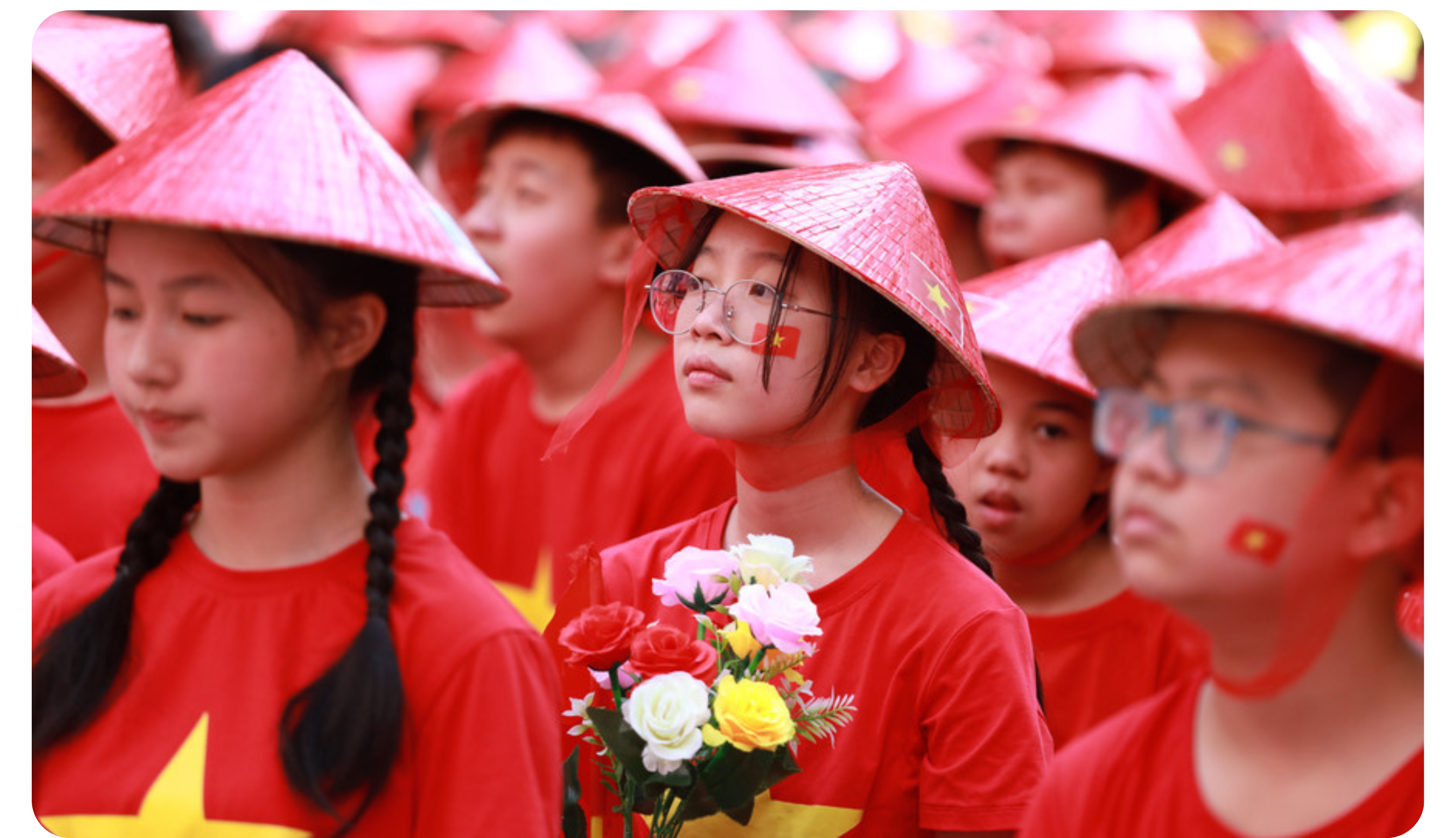
What message does the Minister want to send to teachers, students and the entire industry so that together we can start the new school year with the highest spirit and determination?
Minister Nguyen Kim Son: In the 2024-2025 school year, the entire sector has strived to overcome many difficulties and challenges and achieved many good results. On behalf of the leaders of the Ministry of Education and Training, I would like to acknowledge, commend and thank the outstanding efforts of the team of managers, teachers, staff and students.
The 2025-2026 school year is a very important school year, with many important tasks to be done and many opportunities for innovation. The keyword of this school year is "implementation". That is to focus on implementing well the Party's guidelines and policies, the State's laws on education as well as the 10 key tasks and solutions for the 2025-2026 school year of the Education sector. That is the way for the whole sector to inherit and promote the achievements of the past 80 years, overcome existing shortcomings and limitations and open up new paths for Vietnamese education in the coming time.
Education is a hundred-year career, requiring vision, perseverance, a spirit of fairness and the highest responsibility. I call on the entire industry, from managers to teachers, staff, and all students to prepare the best mindset, spirit and conditions, to unite and join forces, so that the new school year will be a busy but joyful and successful one.

How does the Minister view the opportunities for the education sector when the Politburo issued Resolution No. 71-NQ/TW on breakthroughs in education and training development right before the new school year?
Minister Nguyen Kim Son: It can be said that this school year, the education sector is facing unprecedented opportunities. Never before has education and training received as much attention and expectation from the Party and the State as it does today. The most important of which is the recent issuance of Resolution No. 71-NQ/TW by the Politburo.
Resolution No. 71/NQ-TW was issued on the occasion of the 80th anniversary of National Day, 80 years of tradition of the Education sector and also the 80th anniversary of the establishment of the Ministry of National Education (now the Ministry of Education and Training) continuing to demonstrate the Party's special attention to education and training; affirming that education is always an element closely linked to and decisive for the country's development; showing the consistency of the view that education and training is the top national policy, deciding the future of the nation.
The Resolution also demonstrates the Party's new vision and strategy for the future education system, when the world context is undergoing profound and comprehensive changes, especially digital technology and artificial intelligence are reshaping education on a global scale. In addition, the Resolution has identified major goals along with a series of tasks and solutions of a strong breakthrough nature to innovate and improve Vietnamese education.
For the entire education sector, this is a great opportunity to make a breakthrough, to affirm the decisive position of education in the country's development. Aware of this, the Ministry of Education and Training is urgently developing and submitting to the Government a draft of the Government's Action Program to implement Resolution 71 and will concretize it with the Ministry of Education and Training's Action Plan to implement it right from the beginning of this school year.
The 2025-2026 school year is the first year of implementing educational management under the two-tier local government model. Could the Minister tell us what solutions the Ministry of Education and Training has taken to ensure that educational activities are not disrupted?
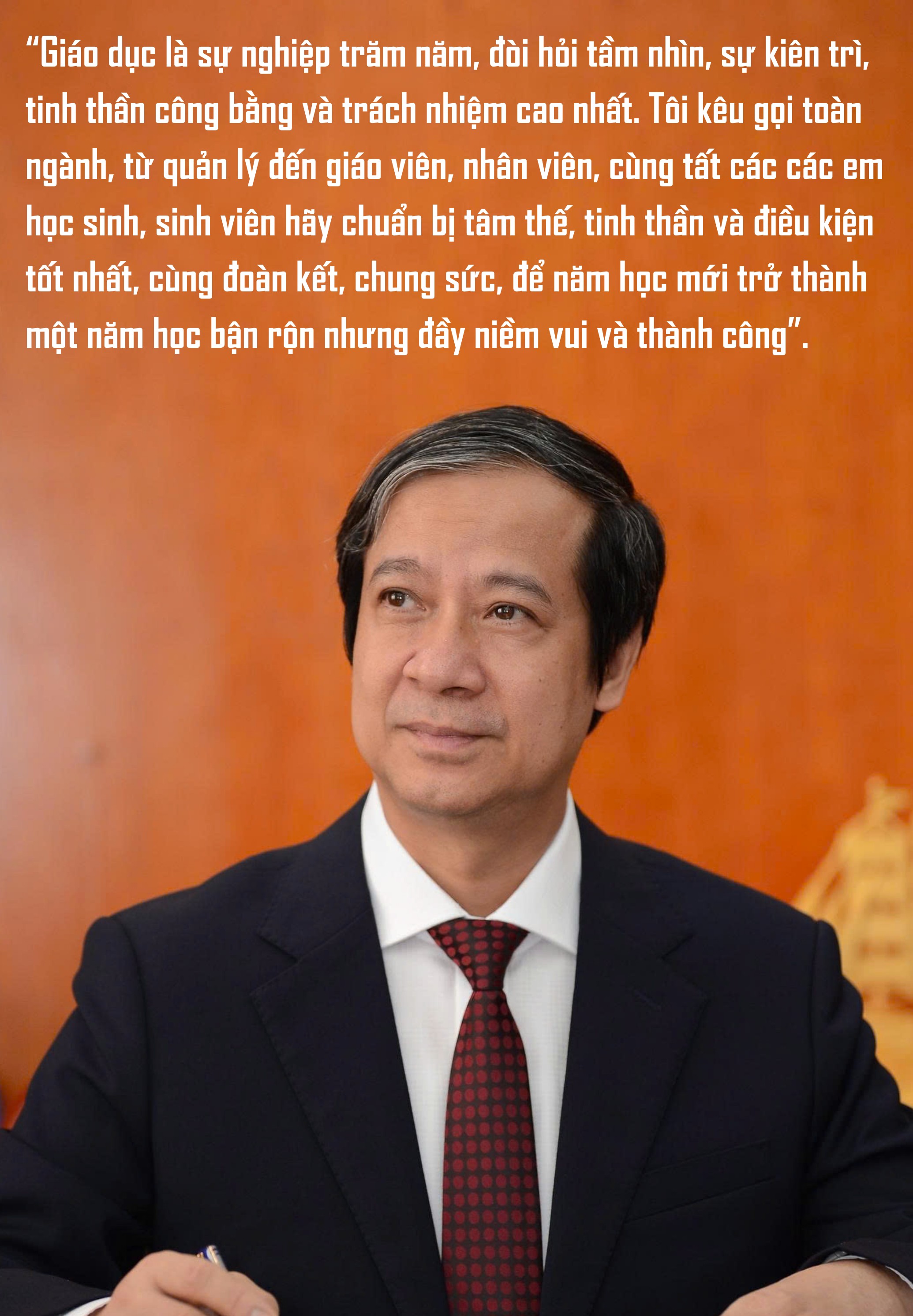
Minister Nguyen Kim Son: To ensure that educational activities are not disrupted in the context of two-level local government, the Ministry of Education and Training has implemented many synchronous solutions.
Regarding institutional improvement, the Ministry has developed and issued 2 Decrees and 6 Circulars regulating decentralization, delegation of authority, and division of state management authority in the field of education.
Regarding professional guidance, the Ministry has issued official dispatches on primary school admission regardless of administrative boundaries; organizing two sessions per day; implementing tasks for the 2026-2027 school year; implementing programs and textbooks in the context of changes in administrative boundaries... The Ministry also organized seminars, established hotlines, received information and resolved difficulties and problems of localities.
Regarding capacity building, the Ministry has developed documents, organized training courses, and published handbooks to support education managers at the commune level and the Department of Education and Training in accessing complete, systematic, concise, and easy-to-understand information. In addition, the Ministry has also organized 6 inspection teams in 15 provinces on this issue.
In the coming time, the Ministry of Education and Training will continue to review legal documents; strengthen professional guidance; perfect the industry data system, ensure connectivity and synchronization... and continue to accompany and support localities in implementing decentralized and delegated tasks.
To effectively implement educational tasks in the 2025-2026 school year in the new context, the Ministry also noted a number of contents to localities.
First of all, the provincial People's Committee should promptly advise competent authorities to perfect legal institutions and build an effective coordination mechanism between the provincial and communal levels; issue clear regulations on the functions, tasks, and organizational structure of the Department of Education and Training and the Department of Culture and Social Affairs at the communal level, and at the same time assign staffing quotas and the number of labor contracts to educational institutions.
People's Committees at all levels need to effectively implement solutions to inspect and remove difficulties at the commune level; have solutions to mobilize and second specialized staff from the Department of Education and Training or educational institutions to support the commune level, especially in places where commune-level staff do not have expertise. In addition, it is necessary to promote the application of information technology and digital transformation to ensure smooth and timely communication between levels.
The Department of Education and Training needs to coordinate with relevant departments, branches and sectors to develop documents, organize training and in-depth training, and improve professional capacity for commune-level officials and civil servants in charge of education. At the same time, guide the establishment of inter-school and inter-commune professional clusters to organize professional activities and professional training for teachers, replacing the previous direct role of the Department of Education and Training.
Also from the 2025-2026 school year, the implementation of the 2018 General Education Program will enter a new cycle. What are the important contents that the Ministry of Education and Training will discuss regarding the 2018 General Education Program this school year, Minister?
Minister Nguyen Kim Son : The first batch of students graduating from the 2018 General Education Program has shown many positive points. Accordingly, students have experienced a variety of activities, revealed their strengths, chosen subjects with career orientation, and accessed comprehensive knowledge thanks to integrated subjects. However, the implementation of the 2018 General Education Program in the past has also revealed some shortcomings. Specifically, at the high school level, the choice of subjects is limited by teachers and classrooms; at the middle school level, teaching integrated subjects is difficult due to uneven teacher capacity and learning materials.
To overcome this, the Ministry issued Official Dispatch No. 4555/BGDĐT-GDPT dated August 5, 2025, requiring high schools to publicly announce plans to organize teaching of elective subjects, coordinate with other schools to expand opportunities for students; support students when they need to adjust their subject choices. For secondary schools, continue to train teachers in integrated teaching, compile illustrative learning materials, and implement a model of teacher clusters supporting each other, in order to improve quality and create interest in learning.
In the 2025-2026 school year, the Ministry of Education and Training will conduct a comprehensive assessment of the 2018 General Education Program after an implementation cycle to clarify the level of achievement in developing students' qualities and abilities; point out advantages, limitations, causes and propose solutions for adjustment, ensuring the Program is substantial, effective and sustainable.
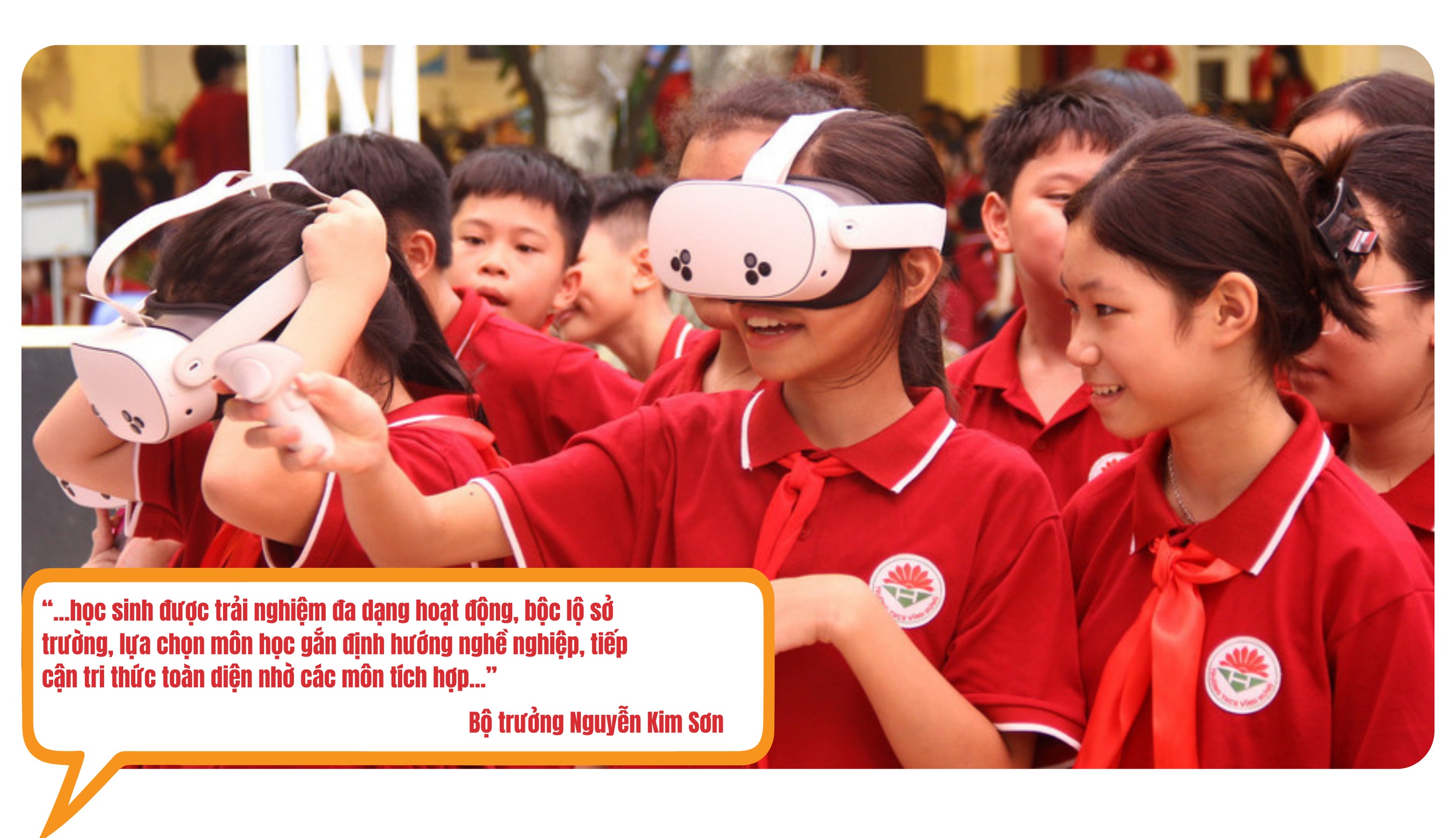
The assessment focuses on: facilities, teaching equipment, teaching staff and management staff, training quality, suitability of textbooks, effectiveness of innovative methods, testing and assessment; at the same time, considering selective teaching in high school and career guidance activities from middle school to ensure students' real right to choose. The Ministry of Education and Training also coordinates with ministries, branches, localities, domestic and foreign experts to conduct comprehensive surveys, research and assessments.
The consistent orientation is to adhere to the goal that has been determined by the Party and the National Assembly, which is to comprehensively develop students' qualities and abilities, linked to the requirements of human resource training for the new period. The spirit is to look straight at the truth, evaluate objectively, and make timely adjustments, all for the sake of students.
- Thank you very much, Minister!
Performed by: Hieu Nguyen. Designed by: Le Nghia.
Source: https://giaoducthoidai.vn/nganh-giao-duc-dao-tao-chang-duong-80-nam-va-su-menh-kien-tao-con-nguoi-viet-nam-post746910.html








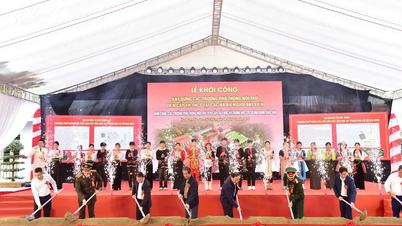
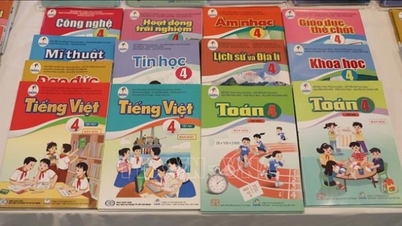

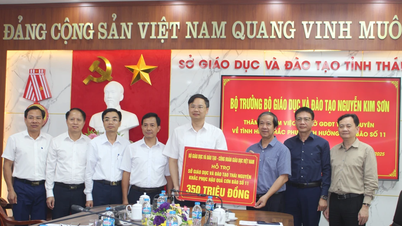
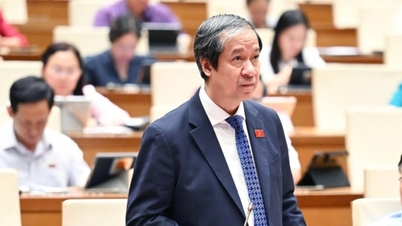
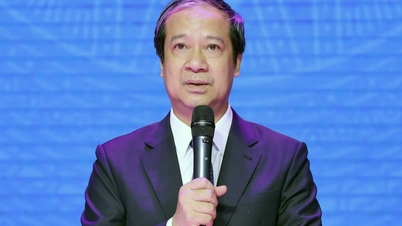
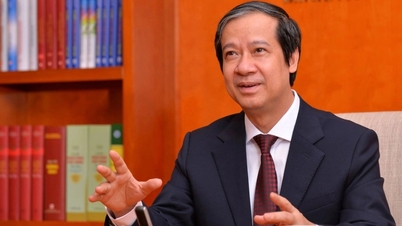





![[Video] Groundbreaking ceremony of inter-level boarding schools in the border areas of Tuyen Quang and Lao Cai](https://vphoto.vietnam.vn/thumb/402x226/vietnam/resource/IMAGE/2025/11/09/1762702287645_lao-cai-ha-giang-6159-jpg.webp)

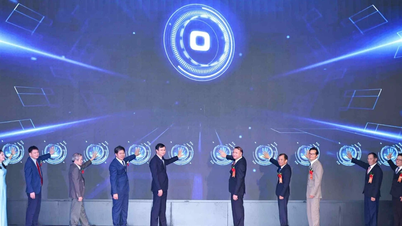
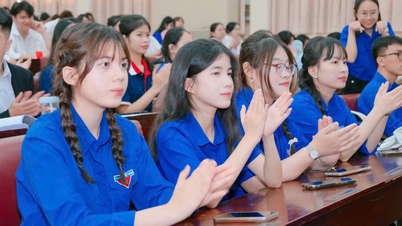

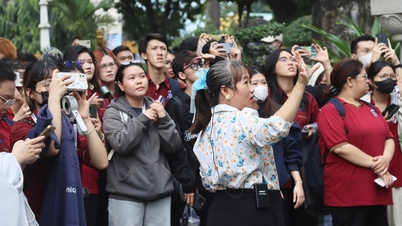





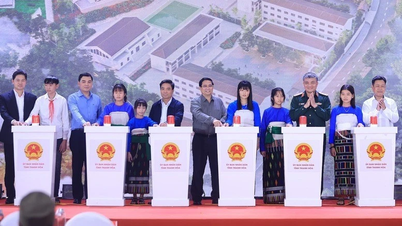


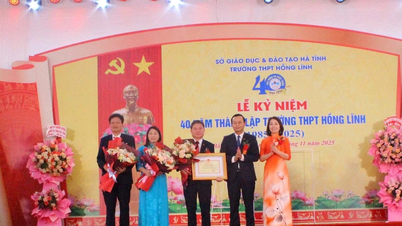
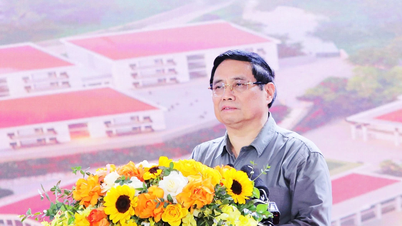
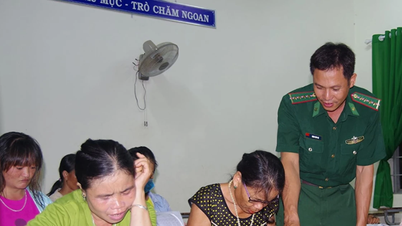





































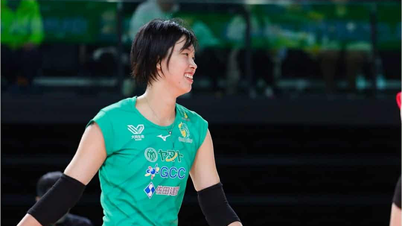


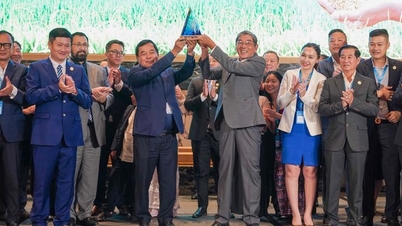



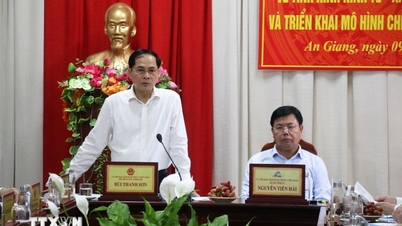










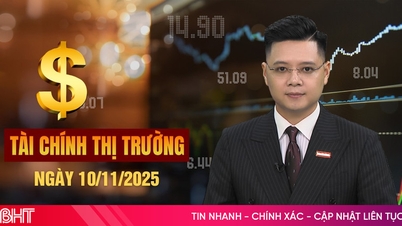

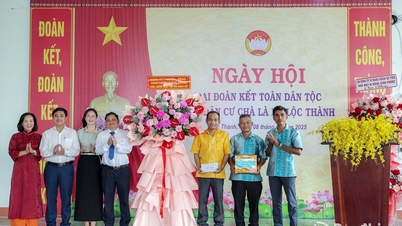














Comment (0)